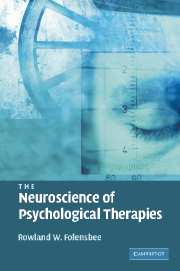Book contents
- Frontmatter
- Contents
- Acknowledgements
- 1 Introduction
- Part 1 Basic concepts
- Part 2 The process of psychotherapy
- 10 Introduction to neuroscience applications in psychotherapy
- 11 Intake and assessment
- 12 Neural networks in therapy
- 13 Affect in therapy
- 14 Memory and change
- 15 Anxiety and change
- 16 The experience of improvement in psychotherapy
- 17 The therapist's neuroscience
- 18 Communicating with clients through neuroscience
- 19 Integrating traditional therapies
- 20 Applying neuroscience to depression intervention
- 21 Neuroscience and psychotherapy: moving forward
- Appendix: Neuroimaging and psychological therapies
- References
- Index
11 - Intake and assessment
Published online by Cambridge University Press: 15 December 2009
- Frontmatter
- Contents
- Acknowledgements
- 1 Introduction
- Part 1 Basic concepts
- Part 2 The process of psychotherapy
- 10 Introduction to neuroscience applications in psychotherapy
- 11 Intake and assessment
- 12 Neural networks in therapy
- 13 Affect in therapy
- 14 Memory and change
- 15 Anxiety and change
- 16 The experience of improvement in psychotherapy
- 17 The therapist's neuroscience
- 18 Communicating with clients through neuroscience
- 19 Integrating traditional therapies
- 20 Applying neuroscience to depression intervention
- 21 Neuroscience and psychotherapy: moving forward
- Appendix: Neuroimaging and psychological therapies
- References
- Index
Summary
Neuroscience concepts can influence what information is gathered during the intake process. Various schools of psychotherapy support obtaining information in various specific areas of psychological and personal functioning, but consideration of brain function encourages collection of a broader range of information while maintaining awareness of how the various pieces of information relate to each other. Psychodynamic (Fenichel, 1945) and object relations (Mahler et al., 1975) theories emphasize gathering information regarding the family dynamics within which the patient developed. Behavior analysis (Bellack et al., 1990) emphasizes the identification of environmental stimulus events, description of problem behaviors, and delineation of consequences of behavior. Traditional cognitive behavioral therapy encourages the identification of irrational thoughts that occur in response to specific events and ideas (Beck, 1976). A brain-based model of psychotherapy directs the therapist to gather information related to each of these areas so a full understanding of brain-based behaviors related to problematic functioning can be obtained. A brain-based model provides for identification of all possible contributors to the current shape and function of the brain, and calls for as complete an understanding as possible of how these contributors interact.
The intake interview designed to support a neuroscience-based model of intervention includes information from the following areas:
Genetics
Biological events
Early interpersonal patterns
Later interpersonal patterns
History of family structure and events
Current behavioral functioning
Information from these areas might be collected in support of therapy based on any of the various schools of intervention, but using the brain to guide assessment leads to changes in the process of gathering intake information as well as in the content of intake interviews.
- Type
- Chapter
- Information
- The Neuroscience of Psychological Therapies , pp. 85 - 98Publisher: Cambridge University PressPrint publication year: 2007



